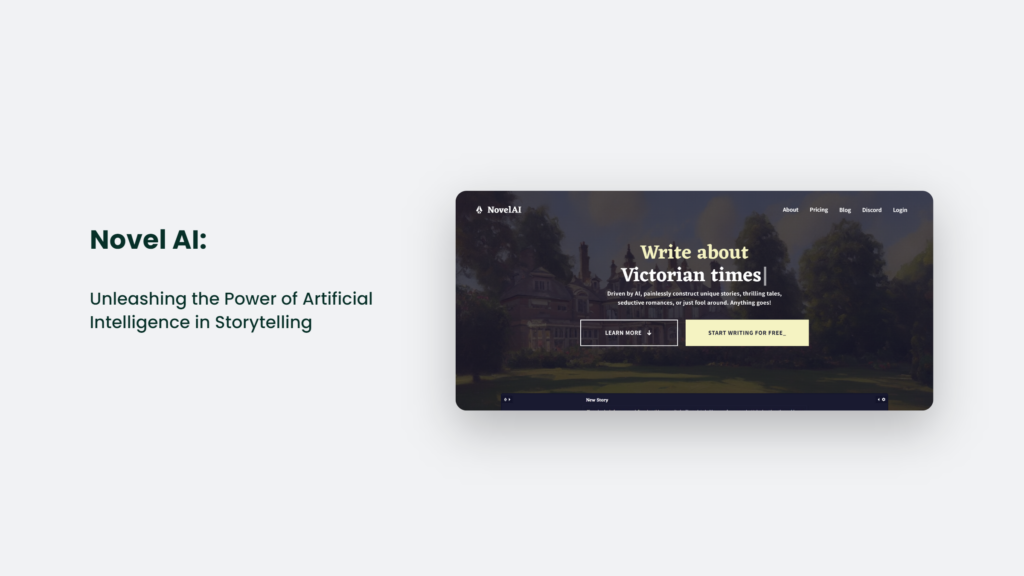

Novel AI: Unleashing the Power of Artificial Intelligence in Storytelling

As Seen On
In the ever-evolving world of technology, artificial intelligence (AI) has become a game-changer, revolutionising various industries and transforming how we live, work, and create. One such innovation that has captured the imagination of writers and readers alike is Novel AI.
This cutting-edge AI-powered storytelling tool promises to redefine the creative writing process. But is this AI-driven platform truly the future of fiction or another gimmick in the rapidly expanding AI market? Let’s dive into the world of Novel AI and explore its potential, limitations, and impact on the literary landscape.

The Magic Behind Novel AI: It’s Not Rocket Science, or Is It?
Novel AI is an AI-assisted authorship platform that uses advanced algorithms to generate unique and personalised stories based on user input. With a focus on fiction, Novel AI offers a range of customisation options, allowing users to adjust parameters such as creativity, risk, and repetitiveness to create the perfect narrative. The platform’s AI models, trained on real literature, adapt seamlessly to user input, maintaining the writer’s perspective and style.
But what sets Novel AI apart from other AI writing tools? The answer lies in its simplicity and specificity. Unlike many AI generators that struggle to produce coherent and engaging content, Novel AI focuses on fiction, offering users an easy-to-use interface and a range of AI models tailored to different storytelling styles.
This combination of simplicity and specificity has made Novel AI popular among writers looking to experiment with AI-assisted storytelling.
The Pros and Cons of Novel AI
Novel AI has its fair share of advantages and drawbacks, as with any new technology. Here are some key points to consider:
Pros:
Easy to use: Novel AI’s user-friendly interface makes it accessible to writers of all skill levels.
- Customisable: Users can adjust various parameters to fine-tune their stories, ensuring a unique and personalised experience.
- Genre-specific: Novel AI’s focus on fiction sets it apart from other AI writing tools, making it an ideal choice for aspiring storytellers.
- Collaborative: The platform allows users to work alongside the AI, creating a dynamic and interactive writing experience.
Cons:
- Limited functionality: While Novel AI excels in fiction, it may not be suitable for other types of writing, such as academic or technical content.
- Inconsistency: Some users have reported issues with the AI’s ability to maintain character consistency and avoid introducing random elements into the narrative.
- Subscription-based: Novel AI operates on a monthly subscription model, which may not be ideal for users looking for a one-time solution.
Novel AI in Action: Real-World Examples and Success Stories
Despite its limitations, Novel AI has garnered a loyal following among writers and readers alike. Users have praised the platform for its ease of use, genre-specific focus, and ability to generate engaging and original content.
Some have even used Novel AI to create entire novels, pushing the boundaries of AI-assisted storytelling and challenging traditional notions of authorship.
In addition to its storytelling capabilities, Novel AI has succeeded in other creative domains, such as image generation and text-based adventure games. These diverse applications demonstrate the platform’s versatility and potential for future growth.
The Future of AI in Storytelling: Embracing the Unknown
As AI continues to advance, it’s clear that tools like Novel AI will play an increasingly prominent role in the world of storytelling. While some may fear the potential loss of jobs for writers, editors, and designers, others argue that AI will never replace the human touch that makes great writing truly unique.
Instead, AI could serve as a powerful tool for writers, helping them to overcome creative blocks, explore new genres, and push the boundaries of their craft.
So, is Novel AI the future of fiction? Only time will tell. But one thing is certain: as AI continues to evolve, the possibilities for storytelling are virtually limitless.
Conclusion: Embracing the AI-Assisted Future of Fiction Writing
In conclusion, Novel AI has undoubtedly significantly impacted the world of fiction writing, offering writers a unique and powerful tool to enhance their creative process. While it may not replace human authors entirely, it has the potential to revolutionise the way we approach storytelling, pushing the boundaries of creativity and collaboration.
As we continue to explore the possibilities of AI in storytelling, it’s essential to embrace the unknown and recognise the potential for growth and innovation in this exciting new frontier. So, let’s raise a toast to Novel AI and the hilariously ingenious future of fiction writing it promises to bring.
Konger
Up until working with Casey, we had only had poor to mediocre experiences outsourcing work to agencies. Casey & the team at CJ&CO are the exception to the rule.
Communication was beyond great, his understanding of our vision was phenomenal, and instead of needing babysitting like the other agencies we worked with, he was not only completely dependable but also gave us sound suggestions on how to get better results, at the risk of us not needing him for the initial job we requested (absolute gem).
This has truly been the first time we worked with someone outside of our business that quickly grasped our vision, and that I could completely forget about and would still deliver above expectations.
I honestly can't wait to work in many more projects together!
Disclaimer
*The information this blog provides is for general informational purposes only and is not intended as financial or professional advice. The information may not reflect current developments and may be changed or updated without notice. Any opinions expressed on this blog are the author’s own and do not necessarily reflect the views of the author’s employer or any other organization. You should not act or rely on any information contained in this blog without first seeking the advice of a professional. No representation or warranty, express or implied, is made as to the accuracy or completeness of the information contained in this blog. The author and affiliated parties assume no liability for any errors or omissions.

